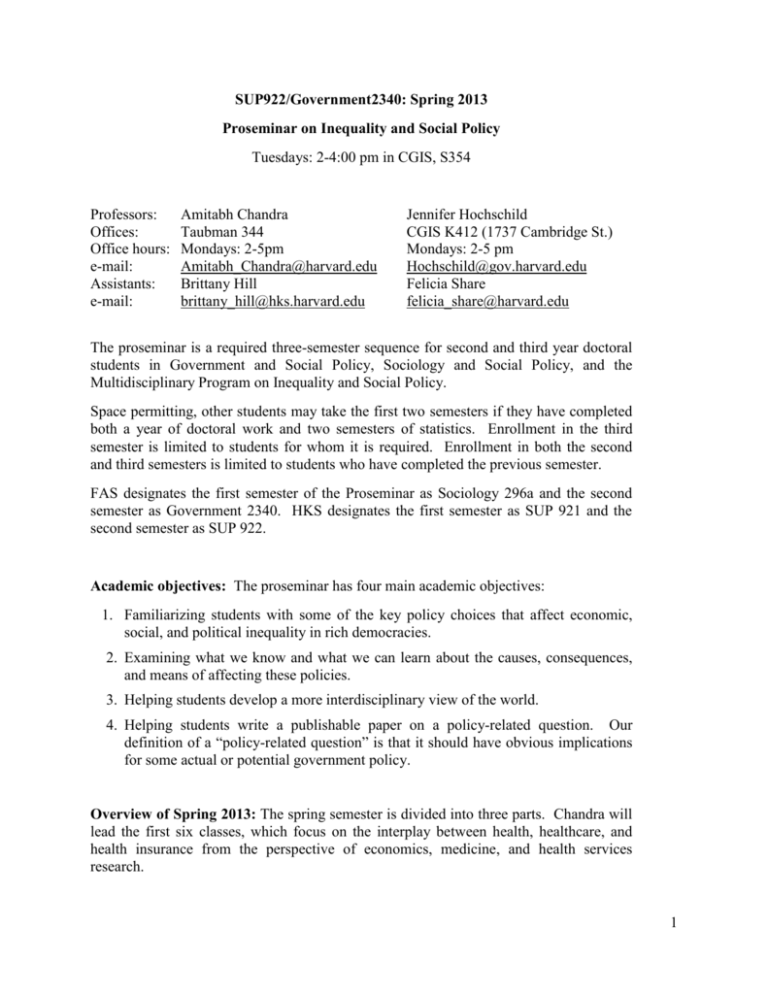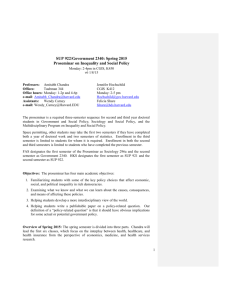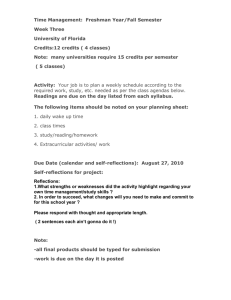Proseminar on Inequality and Social Policy
advertisement

SUP922/Government2340: Spring 2013 Proseminar on Inequality and Social Policy Tuesdays: 2-4:00 pm in CGIS, S354 Professors: Offices: Office hours: e-mail: Assistants: e-mail: Amitabh Chandra Taubman 344 Mondays: 2-5pm Amitabh_Chandra@harvard.edu Brittany Hill brittany_hill@hks.harvard.edu Jennifer Hochschild CGIS K412 (1737 Cambridge St.) Mondays: 2-5 pm Hochschild@gov.harvard.edu Felicia Share felicia_share@harvard.edu The proseminar is a required three-semester sequence for second and third year doctoral students in Government and Social Policy, Sociology and Social Policy, and the Multidisciplinary Program on Inequality and Social Policy. Space permitting, other students may take the first two semesters if they have completed both a year of doctoral work and two semesters of statistics. Enrollment in the third semester is limited to students for whom it is required. Enrollment in both the second and third semesters is limited to students who have completed the previous semester. FAS designates the first semester of the Proseminar as Sociology 296a and the second semester as Government 2340. HKS designates the first semester as SUP 921 and the second semester as SUP 922. Academic objectives: The proseminar has four main academic objectives: 1. Familiarizing students with some of the key policy choices that affect economic, social, and political inequality in rich democracies. 2. Examining what we know and what we can learn about the causes, consequences, and means of affecting these policies. 3. Helping students develop a more interdisciplinary view of the world. 4. Helping students write a publishable paper on a policy-related question. Our definition of a “policy-related question” is that it should have obvious implications for some actual or potential government policy. Overview of Spring 2013: The spring semester is divided into three parts. Chandra will lead the first six classes, which focus on the interplay between health, healthcare, and health insurance from the perspective of economics, medicine, and health services research. 1 Hochschild will lead the next six classes, which will focus on the role of political activity, governmental institutions, and policy choices in shaping public-sector activities that exacerbate or mitigate various forms of inequality. In the final two classes (weeks 13 and 14, scheduled for the last two weeks of the semester), students will each present a 10 minute summary of the research that they have been working on since Fall 2012, after which both faculty and other students will make comments and suggestions. Reading: We will read and discuss the equivalent of roughly five to six research papers each week. Most of the readings are available on a CD in the Harvard Kennedy School (HKS) library. You can copy this CD onto your laptop and make one (1) copy for your personal use. Reproducing the CD for any other purpose is illegal. The CD contains both required and recommended readings. You should read all the required papers. Some readings are available electronically through Hollis (url is included in the syllabus), or available as a pdf under Additional Readings on the course website. For these too, you may make one (1) copy for your personal use only. Some of the books are available at the Coop. They are: Atul Gawande, Better: A Surgeon's Notes on Performance (Picador, 2008) Martin Gilens, Affluence and Influence: Economic Inequality and Political Power in America (Princeton University Press, 2012) Albert Hirschman, Exit, Voice, and Loyalty: Responses to Decline in Firms, Organizations, and States (Harvard U Press, 1971) Lawrence Jacobs and Theda Skocpol, Health Care Reform and American Politics, revised and expanded ed., (Oxford U Press, 2012) Michael Lipsky, Street-Level Bureaucracy: Dilemmas of the Individual in Public Service, 30th Anniversary Expanded Ed. (Russell Sage Foundation, 1980) Eric Patashnik, Reforms at Risk: What Happens After Major Policy Changes Are Enacted (Princeton University Press, 2008) Brian Steensland, The Failed Welfare Revolution: America's Struggle over Guaranteed Income Policy (Princeton University Press, 2007) Kay Lehman Schlozman, Sidney Verba, Henry E. Brady The Unheavenly Chorus: Unequal Political Voice and the Broken Promise of American Democracy (Princeton University Press, 2012) Format of classes: Classes will start promptly at 2:10pm. Memos: During the first six weeks all students, including auditors, must write six memos of no more than 500 words about the readings and help lead one class discussion. Memos about the reading for a Tuesday class are due by midnight on the Sunday prior to 2 class. Note that since the main purpose of the memos is to enhance the quality of class discussion, late memos will not count towards your quota. Everyone is expected to read their classmates’ memos, so you should deposit your memo in the appropriate dropbox on the course website. Recipients often use e-mail subject lines to file memos, so subject lines need to follow a common format. The subject line should read: “[YOUR NAME] - Proseminar memo for [SEMINAR DATE]” Insert the date of the seminar, not the date on which you are writing the memo. Discussion Leaders: Two per class, except for first class where there are three. Students will start each week’s discussion. Assignments for the first 6 weeks have been made below, in topic headings for each session; assignments for the second six weeks will be made early in the semester. Discussion leaders should meet with the instructor on Monday to plan this part of the class, prepare a one page outline identifying the issues they think the class should discuss, and bring enough copies for everyone to class. Discussion leaders will keep their initial comments to no more than 10 minutes. Their main job thereafter is to ensure that discussion for the rest of the class moves from one item to the next in a timely way. Goals: Both memos and class discussion should (briefly!) cover at least four issues: 1. Summarize the salient points of the paper. If the paper performs original empirical work (as distinguished from citing the work of others), be sure to explain what data was used and what empirical strategy was used to arrive at the conclusion. 2. What is the most significant thing we learn from the paper, and why does it matter? 3. Are there important methodological questions about the validity of the empirical claims made in the papers? If so, which ones are most important and how do they matter? 4. Do the papers have important policy implications, either explicit or implicit? Under what conditions, if any, are those implications likely to hold? Grading: Your paper counts for half of the grade in this class. The remaining grade will depend on your instructors’ evaluation of your performance during the six week module that each is responsible for (i.e. half determined by Chandra and half by Hochschild). Second Semester Deadlines: May 1, 2013. Research papers are due unless your advisor has given you an extension in writing. If you want to receive an A.M, degree in May 2013, this is a hard deadline. However, students who will be taking the third semester of the proseminar should plan to spend a substantial part of the summer working on their paper. Your advisor can extend the deadline as late as July 15. Advisors will set due dates that allows them to return your paper by August 1. 3 July 15, 2013: No extensions for your second semester paper will be granted beyond this date. Half your second semester grade will be based on the paper you submit by this time. Third semester (Fall 2013): The third semester focuses on revising your second-semester paper for submission to a scholarly journal. You will be paired with a speaker for the Monday seminar, who will read and comment on your paper. You will also present your paper in the fall Proseminar. Your presentation should be no more than 20 minutes; it will be followed by 20 minutes of comments from the outside speaker and 20 minutes of open discussion. You are expected to attend your classmates’ presentations and to provide written comments on their papers prior to their presentations. Writing these comments is a prerequisite for receiving credit for the seminar, which in turn is necessary both to collect an Inequality and Social Policy Fellowship and to receive a Social Policy degree. Students taking the third semester of the proseminar must send their paper to the outside speaker who will comment on it, and to members of the seminar, at least two weeks before their presentation date. Those with early presentation dates should plan on making final revisions in late August. Revised papers may be due as early as August 25. Because your presentation date is also the date on which your commentator has agreed to speak in the Monday seminar, it cannot be changed. Readings and Topics for Spring 2013 NOTE: Beth Truesdale, a student in the Social Policy program who took this course several years ago, has offered to meet with the class at 2 p.m. on some weeks. She will give a 10-minute mini-lecture on a statistical and methodological issue raised by one of the papers assigned for that week, before our official start time of 2:10. This pre-class session is voluntary, but we recommend that you attend some or all. January 29: Linkages between Health and Healthcare Discussion led by Walsh, Cohodes and Gidron: 1. Banks, James, Smith James P. 2010. “International Comparisons in Health Economics: Evidence from Aging Studies.” Annual Review of Economics. 2. Baumgardner, James R., Bilheimer, Linda T, Booth, Mark B., Carrington, William J., Duchovny , Noelia J., and Werble , Ellen C. 2012. “Cigarette Taxes and the Federal Budget: Report from the CBO.” The New England Journal of Medicine. 3. Bleakley, Hoyt, 2010. “Health Human Capital and Development.” Annual Review of Economics. Vol 2. 283-310. 4 4. Das J, Holla A, Das V, Mohanan M, Tabak D, Chan B. 2012. “In urban and rural India, a standardized patient study showed low levels of provider training and huge quality gaps.” Health Affairs. Dec;31(12):2774-84. 5. Cutler, David, Angus Deaton and Adriana Lleras-Muney. 2006. “The Determinants of mortality.” Journal of Economic Perspectives 20(3): 97-120. February 5: Determinants of Health Discussion led by Asad and Bau 1. Ludwig, Jens, Sanbonmatsu, Lisa, Gennetian, Lisa, Adam, Emma, Duncan, Greg J., Katz , Lawrence F., Kessler, Ronald C., Kling, Jeffrey R., Lindau, Stacy Tessler, Whitaker, Robert C. and McDade, Thomas W. 2011. “Neighborhoods, Obesity, and Diabetes: A Randomized Social Experiment.” The New England Journal of Medicine. 2. The Healthy Study Group 2010. “A School-Based Intervention for Diabetes Risk Reduction.” The New England Journal of Medicine. 3. Almond, Douglas, and Janet Currie. 2011. "Killing Me Softly: The Fetal Origins Hypothesis." Journal of Economic Perspectives, 25(3): 153-72. 4. Kling, J. R., Liebman, J. B. and Katz, L. F. 2007, “Experimental Analysis of Neighborhood Effects.” Econometrica, 75: 83–119 5. Christakis, Nicholas A. and Fowler, James H. 2007. “The Spread of Obesity in a Large Social Network over 32 Years.” The New England Journal of Medicine. February 12: Health Insurance Design Discussion led by Bell and Linos 1. Aviva Aron-Dine, Liran Einav, and Amy Finkelstein. 2013. “The RAND Health Insurance Experiment, Three Decades Later.” Forthcoming. Journal of Economic Perspectives, 27(1). 2. Chandra, Amitabh, Jonathan Gruber and Robin McKnight. 2010. “Patient Cost-Sharing and Hospitalization Offsets in the Elderly.” American Economic Review 100, 1, 193-213. 3. Finkelstein, Amy, Taubman, Sarah, Wright, Bill, Bernsteina, Mira, Grubera, Jonathan, . Newhousead, Joseph P., Allenc, Heidi, Baickera, Katherine Baickera. 2012. “The Oregon Health Insurance Experiment: Evidence from the First Year.” The Quarterly Journal of Economics. 5 4. Sommers , Benjamin D., Baicker , Katherine, and Epstein, Arnold M. 2012. “Mortality and Access to Care among Adults after State Medicaid Expansions.” The New England Journal of Medicine. February 17: Health Insurance Markets Discussion led by Feigenbaum and Leenman 1. Finkelstein, Amy, and Kathleen McGarry. 2006. "Multiple Dimensions of Private Information: Evidence from the Long-Term Care Insurance Market." American Economic Review, 96(4): 938-958. 2. Chandra, Amitabh, Gruber, Jonathan and McKnight, Robin. 2011. “The Importance of the Individual Mandate — Evidence from Massachusetts.” The New England Journal of Medicine. 364:293-295. 3. Albaluck, Jason and Gruber, Jonathan. 2011. “Choice Inconsistencies among the Elderly: Evidence from Plan Choice in the Medicare Part D Program.” American Economic Review. 1180-1210. 4. Einav, Liran, Amy Finkelstein, Iuliana Pascu, and Mark R. Cullen. 2012. "How General Are Risk Preferences? Choices under Uncertainty in Different Domains." American Economic Review, 102(6): 2606-38. February 26: Productivity in Healthcare Discussion led by White, Wu 1. Gawande, Atul. Better: A Surgeon's Notes on Performance. Metropolitan Books, 2007. 2. Chandra, Amitabh, and Jonathan Skinner. 2012. "Technology Growth and Expenditure Growth in Health Care." Journal of Economic Literature, 50(3): 645-80. 3. Chandra, Amitabh, Baicker, Katherine, Skinner, Jonathan, S. 2012. “Saving Money or Just Saving Lives? Improving the Productivity of US Health Care Spending.” Annual Review of Economics.(4) 33-56. 4. Ebbeling CB, Swain JF, Feldman HA, et al. 2012. “Effects of Dietary Composition on Energy Expenditure During Weight-Loss Maintenance.” JAMA. 307(24):2627-2634. 5. Chandra, Amitabh, Anupam B. Jena, and Jonathan S. Skinner. 2011. "The Pragmatist's Guide to Comparative Effectiveness Research." Journal of Economic Perspectives, 25(2): 27-46. 6 March 5: Topics in Healthcare Discussion led by: Schueler and Jaeger 1. Beauchamp, Jonathan P., David Cesarini, Magnus Johannesson, Matthijs J. H. M. van der Loos, Philipp D. Koellinger, Patrick J. F. Groenen, James H. Fowler, J. Niels Rosenquist, A. Roy Thurik, and Nicholas A. Christakis. 2011. "Molecular Genetics and Economics."Journal of Economic Perspectives, 25(4): 57-82. 2. Manski, Charles F. 2011. "Genes, Eyeglasses, and Social Policy." Journal of Economic Perspectives, 25(4): 83-94. 3. Schulman Kevin A., Berlin, Jesse A., Harless, William, Kerner, Jon F., Sistrunk, Shyrl, Gersh, Bernard J., Phil, D. Dubé, Ross, Taleghani, Christopher K., Burke, Jennifer E., Williams, Sankey, Eisenberg, John M., Ayers, William, and Escarce, José J. 1999. “The Effect of Race and Sex on Physicians' Recommendations for Cardiac Catheterization.” The New England Journal of Medicine. 340:618-626. 4. Green, A. R., Dana Carney, D. J. Pallin, L. H. Ngo, K. L. Raymond, L. Iezzoni, and M. R. Banaji. 2007. "Implicit Bias among Physicians and Its Prediction of Thrombolysis Decisions for Black and White Patients."Journal of General Internal Medicine 22: 12311238. 5. Chandra, Amitabh and Staiger, Douglas. O. 2010. “Identifying Provider Prejudice in Healthcare.” NBER Working Paper. 6. Goldman, Dana P. and James P. Smith. 2002. Can Patient Self-Management Help Explain the SES Health Gradient? Proceedings of the National Academy of Sciences of the United States of America. Vol. 99, No. 16: pp. 10929-10934 March 12: Making Social Policy Choices in Public or Private Arenas Discussion led by TBA 1. Albert Hirschman, Exit, Voice, and Loyalty. Harvard University Press, 1971. Skim chapter 1; appendices are optional. 2. Edward Lindblom, Politics and Markets. Basic Books, 1977. Chapters 5, 6, 13, 14. 3. Terry Moe, Schools, Vouchers, and the American Public. Brookings Institution Press, 2001. Chapters 1, 8, 10. 4. Vanessa Bouche and Craig Volden. 2011. “Privatization and the Diffusion of Innovation,” Journal of Politics, 73 (2): 428-442. 7 March 26: Incentives, Worldviews, and Actions of Public Officials Discussion led by TBA 1. David Mayhew, Congress: The Electoral Connection. Yale University Press, 1974. 2. Richard Neustadt, Presidential Power and the Modern Presidents. Free Press 1990. Chapters 3, 4, 5. 3. William Howell, Power without Persuasion. Princeton University Press, 2003. Chapters 1, 4. 4. Terry Moe, “The Politics of Bureaucratic Structure” in Can the Government Govern? John Chubb and Paul Peterson, eds. Brookings Institution Press, 1989. 5. Lawrence Jacobs and Theda Skocpol, Health Care Reform and American Politics, revised and expanded ed. Oxford U Press, 2012. Chapters 2, 3. April 2: Role of the Public and Groups in Making Policy Choices Discussion led by TBA 1. Kay Lehman Schlozman, Sidney Verba, and Henry Brady. The Unheavenly Chorus: Unequal Political Voice and the Broken Promise of American Democracy. Princeton University Press, 2012. Chapters 11, 12, 14. 2. John Kingdon, Agendas, Alternatives, and Public Policies. Second ed. HarperCollins 1995. Chapter 8. 3. Robert Erikson, Michael MacKuen, and James Stimson. The Macro Polity. Cambridge University Press, 2002. Chapters 1, 6, 8, 9. 4. Martin Gilens, Affluence and Influence: Economic Inequality and Political Power in America. Russell Sage Foundation and Princeton University Press, 2012. Chapters 3, 4. April 9: Policy Implementation Discussion led by TBA 1. Jeffrey Pressman and Aaron Wildavsky, Implementation. University of California Press, 1984. Chapters 3 (skim), 5, 6. 2. Eric Patashnik, Reforms at Risk: What Happens After Major Policy Changes Are Enacted. Princeton University Press, 2008. Chapters 3, 5. 3. Michael Lipsky, Street-Level Bureaucracy: Dilemmas of the Individual in Public Service, 30th anniversary expanded ed. Russell Sage Foundation, 1980. Chapters 2, 3, 4, 5, 7, 8. 8 4. John Brehm and Scott Gates, Working, Shirking, and Sabotage: Bureaucratic Response to a Democratic Public. University of Michigan Press, 1997. Chapters 6, 7. 5. Jacobs and Skocpol, Health Care Reform and American Politics. Chapter 5. April 16: Long-term Impact of Policy and Political Choices Discussion led by TBA 1. Paul Pierson. 1993 “When Effect Becomes Cause: Policy Feedback and Political Change,” World Politics 45(4): 595-626. 2. Jacob Hacker, “Privatizing Risk without Privatizing the Welfare State: The Hidden Politics of Social Policy Retrenchment in the United States,” American Political Science Review 98: 2 (May 2004): 243-60. 3. Bruno Palier and Kathleen Thelen “Institutionalizing Dualism: Complementarities and Change in France and Germany,” Politics & Society 38: 1 (March 2010), 119-148. 4. Ira Katznelson and Suzanne Mettler, 2008. “On Race and Policy History: A Dialogue About the G.I. Bill,” Perspectives on Politics. Vol. 6, (3): 519-37. 5. Alberto Alesina and Edward Glaeser, Fighting Poverty in the US and Europe: A World of Difference. Oxford University Press, 2004. Chapters 4, 7. April 23: Political and Policy Strategies for Creating Successful Social Policies Discussion led by TBA 1. Richard Alba, Blurring the Color Line, Harvard University Press, 2009. Chapters 5, 6. 2. Schlozman, Verba, and Brady. The Unheavenly Chorus. Chapter 17. 3. Xavier de Souza Briggs, Democracy as Problem Solving: Civic Capacity in Communities around the Globe. MIT Press, 2008. Chapters 9-11. 4. Vilsa Curto, Roland Fryer, Jr. and Meghan Howard. “It May Not Take a Village: Increasing Achievement Among the Poor,” in Greg Duncan and Richard Murnane (eds.), Whither Opportunity? Rising Inequality, Schools, and Children’s Life Chances. Russell Sage Foundation and Spencer Foundation, 2011. Chapter 23. 5. Brian Steensland, The Failed Welfare Revolution: America's Struggle Over Guaranteed Income Policy. Princeton University Press, 2007. Chapters 4, 5, 7, 8. April 30 and May 1: student presentations of second draft of Social Policy papers 9








